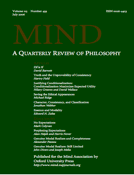-
Views
-
Cite
Cite
Hilary Greaves, David Wallace, Justifying Conditionalization: Conditionalization Maximizes Expected Epistemic Utility, Mind, Volume 115, Issue 459, July 2006, Pages 607–632, https://doi.org/10.1093/mind/fzl607
Close - Share Icon Share
Abstract
According to Bayesian epistemology, the epistemically rational agent updates her beliefs by conditionalization: that is, her posterior subjective probability after taking account of evidence X, pnew, is to be set equal to her prior conditional probability pold(·|X). Bayesians can be challenged to provide a justification for their claim that conditionalization is recommended by rationality—whence the normative force of the injunction to conditionalize?
There are several existing justifications for conditionalization, but none directly addresses the idea that conditionalization will be epistemically rational if and only if it can reasonably be expected to lead to epistemically good outcomes. We apply the approach of cognitive decision theory to provide a justification for conditionalization using precisely that idea. We assign epistemic utility functions to epistemically rational agents; an agent’s epistemic utility is to depend both upon the actual state of the world and on the agent’s credence distribution over possible states. We prove that, under independently motivated conditions, conditionalization is the unique updating rule that maximizes expected epistemic utility.



